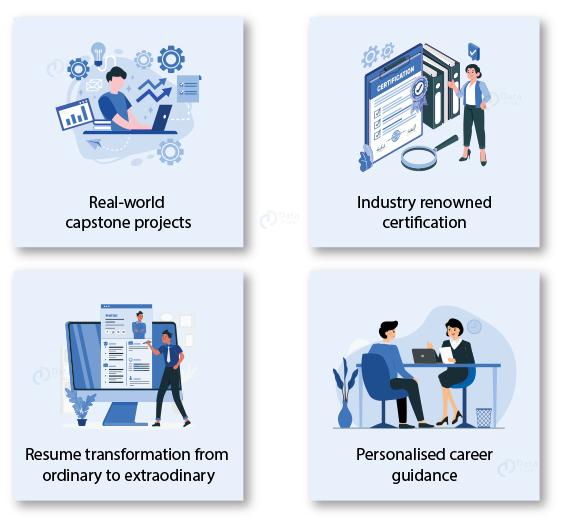Free JSP Certification Course [Hindi]
 You’ll delve into the world of dynamic web programming using Java in this in-depth JSP (Java Server Pages) course. By smoothly integrating Java code with HTML, you can master the art of building interactive, data-driven web sites. This course gives you the abilities you need to be successful in contemporary web development, from processing user input to creating reliable web apps.
You’ll delve into the world of dynamic web programming using Java in this in-depth JSP (Java Server Pages) course. By smoothly integrating Java code with HTML, you can master the art of building interactive, data-driven web sites. This course gives you the abilities you need to be successful in contemporary web development, from processing user input to creating reliable web apps.
What will you take home from this Free JSP Course?
- Self-paced video course
- 170+ hrs of study material, practicals, quizzes
- Acquire practical knowledge which industry needs
- Practical JSP course with real-time case-studies
- Lifetime access with industry renowned certification
Why should you enroll in this Free JSP course?
- Ability to write JSP code proficiently to generate dynamic web pages
- Abilities to control cookies, user sessions, and handle requests and responses
- Understanding of JDBC database integration for data-driven applications
- Understanding of how JSP fits within the Model-View-Controller (MVC) architecture
- The capacity to control user authentication and secure web applications
- Practical knowledge of using JSP to build full-featured web projects
- Take advantage of the ease of online learning platforms to study at your own speed
- Learn through interactive activities like debates, quizzes, and assignments
- Make contact with other students and industry experts and experience the industry environment
- For ongoing learning, access course materials even after the course has ended
- Learn from knowledgeable professors who have a thorough understanding of JSP and web development
- Apply what you’ve learned to practical projects that mimic business settings
- Include all facets of JSP, from the basics to more advanced subjects
- Develop abilities that employers in the web development industry highly value
JSP Course Objectives
A JSP (JavaServer Pages) course’s main goal is to provide participants with the abilities and information needed to create dynamic, interactive web applications. The Java JSP course’s organized curriculum seeks to give students a thorough understanding of JSP’s fundamental ideas, syntax, and real-world applications so they can make interesting and useful web content.
The goal of this JSP course is to give students a thorough understanding of efficient coding methods and web development best practices. Participants will gain knowledge on how to create modular, maintainable code by using custom tags and tag libraries to create reusable components. This JSP course aims to give learners a comprehensive skill set that is not only technically sound but also in line with industry norms and demands by addressing topics including database integration, Model-View-Controller (MVC) architecture, and security considerations.
Participants in our JSP course are given an introduction to the fundamental ideas behind JSP, beginning with its syntax and how to embed Java code in HTML pages. This JSP course often covers fundamental subjects like how to effectively generate dynamic content using JSP tags, expressions, and scripting elements.
The idea of JSP implicit objects, which offer ready-to-use variables for handling things like user requests, session management, and application properties, is also explored by the participants. The development process is streamlined by these built-in objects, which also aid in writing effective code.
The core of JSP courses are custom tags and tag libraries. By facilitating the creation of reusable components, these features encourage the modularity and maintainability of the code. Participants get knowledge on how to create and use custom tags that encompass particular functionalities.
In our JSP course, participants work on practical projects that mimic real-world situations throughout the semester. These assignments help participants put their newly acquired theoretical knowledge into practice while also giving them hands-on experience creating dynamic web applications from start.
The main goal of the JSP course is to teach participants how to use JSP technology to create feature-rich, dynamic, and secure web applications. This JSP course’s all-encompassing methodology gives participants the tools they need to succeed in the dynamic world of web development, making them useful assets in the development of contemporary applications.
Why should you learn JSP?
JSP makes it possible to create dynamic content on the server side, which simplifies comprehensive web development. This enables the creation of interactive web pages that can effectively react to user input and activities. Learning JSP offers a seamless integration of abilities for people who are already familiar with Java programming. It allows you to use your expertise in Java to web programming and create feature-rich, interactive online apps.
The importance of code organization in JSP is one of its significant advantages. It encourages the division of duties among the application’s several concerns, ensuring that display, logic, and data processing continue to be distinct and well-organized. The libraries and custom tags for JSP enable developers to make reusable components. This quickens the development process and keeps the application’s consistency.
Model-View-Controller (MVC) architecture, a common method for creating online applications, and JSP work well together. The distinct separation of various application components makes it easier to create modular, scalable, and maintained programmes.
Learning JSP gives you the ability to use Java to develop dynamic and interactive web applications. It makes the most of your programming abilities, encourages code organization, and creates opportunities for a variety of career routes in the web development industry.
What is JSP?
Using the JavaServer Pages (JSP) technology, dynamic web pages can be made by fusing Java code with HTML text. It was first released as a part of the Java EE (Java Platform, Enterprise Edition) specification by Sun Microsystems, which is now known as Oracle. JSP is made to make it easier to create online applications that need server-side processing and the creation of dynamic content.
Fundamentally, JSP enables the server-side production of dynamic content before it is given to the client’s web browser. This is accomplished by developers being able to integrate Java code directly into HTML templates. This dynamic content might include everything from straightforward data presentation to intricate database interactions. The development of interactive and responsive web apps is made possible by the seamless integration of Java code and HTML.
JSP has many advantages, including code reuse through unique tags and components, access to Java’s extensive libraries and APIs, and the capacity to use Java Database Connectivity (JDBC) to interact with databases. JSP has developed over time and now supports tag libraries like JSTL (JSP Standard Tag Library), which makes routine chores like formatting, conditionals, and looping easier.
What to do before you begin?
Learning JSP can sound complex if you are not familiar with its prerequisites. Even though this course is made to groom the beginners and sharpen the experts simultaneously; it would be of a greater value if one knows the basic fundamentals of JSP. The following pointers are advisable for you to go through before we began with this course.
- Possess a fundamental knowledge of HTML and web development ideas
- Learn the essentials of Java programming
- Set up a Java development environment and a code editor on your computer
The above-mentioned pointers are not mandatory. This advice is only made to improve your journey through this course and make it a cake walk.
Who should go for this free JSP course?
A JSP (JavaServer Pages) course training can be beneficial for a wide range of individuals who are interested in web development, Java programming, and building dynamic web applications. Through and through a JSP course can cater to a diverse audience with varying levels of experience and goals, offering valuable skills that can be applied in various professional contexts. Here’s a list of who should consider going for a JSP course training:
- Coding Enthusiasts
- Professionals who are seeking to upgrade their skills
- Freelancers in IT industry
- Developers who desire expertise in MVC architecture
- Web Designers
- Entrepreneurs and Startups
By enrolling in our JSP course, you can expect the following benefits:
Prior to moving on, participants will develop a thorough understanding of the fundamental ideas behind JSP, including its syntax and structure. The ability to create dynamic content that reacts to user interactions will be made possible by teaching them how to easily incorporate Java code within HTML pages.
Participants will discover the flexibility of JSP tags, expressions, and scripting features as the training unfolds. They will learn how to effectively use these capabilities to produce dynamic content, enhancing the interactivity and engagement of web pages.
Advanced subjects like JSP implicit objects, which offer crucial variables for controlling user sessions, responding to requests, and accessing application-wide data, will also be covered during the training. Participants will discover how to use these pre-built objects to speed up development and produce more complex web apps.
Participants in the JSP training will be competent in utilizing JSP and Java to build dynamic, interactive, and user-centric web applications by the end of the course. They will be able to pursue a variety of careers in web development, Java programming, and related industries thanks to their newly acquired skills.
- Learn how to use JSP to seamlessly integrate Java programming with web development.
- Learn how to develop dynamic content for the web that reacts to user input and activities.
- Learn to use custom tags and tag libraries to build reusable components to increase code reuse.
- Learn how to use JDBC to link JSP applications to databases.
- Learn how JSP fits within the Model-View-Controller framework for structured development using the MVC architecture.
- Opportunities for employment include positions as a full-stack developer, Java developer, and web developer.
- Develop the abilities required to make interactive and captivating web applications by learning web application development.
- Put your knowledge to use by working on real-world projects that reflect real-world situations.
- Gain knowledge in a technology that is still useful for creating contemporary web apps.
- Gaining mastery in a sought-after web development skill will increase your employability.
- Develop your ability to leverage dynamic content production to adapt web apps to user needs.
- Participate in the development of interactive, user-centric web applications.
- Learn how to use JSP technology to produce effective and maintainable code.
- Learn how to plan applications for future expansion and scalability.
- Work well as a team since JSP is frequently combined with other technologies.
- Gain knowledge about safeguarding online apps and avoiding vulnerabilities by practicing security awareness.
Jobs after Learning this JSP Course
The course of JSP is extremely beneficial, especially for someone who is passionate about Java and its workings. The IT sector has huge demand for JSP skilled operators and thus this course ensures you amazing job opportunities. Let’s know more about it.
- Software Engineer: JSP proficiency could make you a candidate for positions as a software engineer, where you would create, test, and maintain software. Web applications, desktop programmes, and even mobile apps fall under this category.
- Architect of Web Applications: In this position, you would be in charge of creating the overall framework and architecture of web applications. Your understanding of JSP and associated technologies can be useful when choosing an architecture.
- Full-Stack Developer: A full-stack developer is skilled in both front-end and back-end programming. You might work on the user interface (UI) and server-side logic if you have knowledge of JSP, which makes you an invaluable asset for developing end-to-end online applications.
- Java Developer: JSP is based on Java technology, thus if you’re a Java developer, learning JSP can help you do your job better. You could work on web applications that use Java’s power as well as server-side applications.
- Web Developer: You can work as a web developer, developing dynamic and interactive web applications, if you have a solid understanding of JSP. You will be in charge of creating, implementing, and maintaining interactive web sites that show real-time data.
- Technical Consultant: If you have knowledge of JSP, you could work as a technical consultant that advises companies on how to use JSP and associated technologies for their web development initiatives.
- Freelancer or Contractor: Being knowledgeable about JSP can make you a sought-after freelancer or contractor. For clients that demand dynamic and interactive websites, you can embark on projects to design custom online solutions.
- Start Your Own Web Projects: Equipped with JSP knowledge, you might also think about establishing your own web-based initiatives, such as developing web applications or even founding an online company.
Our students are working in leading organizations

Online JSP Free Training Course Curriculum
- Basics of web development and the function of JSP
- Putting the development environment together
- JSP syntax and organization
- Java code integration in JSP pages
- Using custom tags and Expression Language (EL)
- Processing form data with HTTP protocols
- Creating dynamic content
- User sessions for HTTP Session
- Using cookies to control state
- Database transactions using JDBC
- Displaying stuff that is database-driven
- Recognising the MVC pattern
- Putting JSP as the view component into practise
- JSTL core tags are used for effective coding
- Conditionals, formatting, and iteration
- Handling exceptions and problems in JSP
- Application security assurance
- Web vulnerabilities, localisation, and internationalization
- JavaScript, HTML, and CSS integration
- Putting ideas into practise to create an entire web application
- Interactive projects to reinforce learning
Features of JSP Free Course


